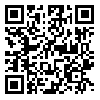1. Güven N. Analysis of the thesis about marital adjustment (2006–2016). International Journal of Psychology and Educational Studies. 2017;4(2):54–63. [
DOI]
2. Murati R. Family in contemporary society. Journal of Human Sciences. 2016;13(1):510–3.
3. Arif M, Sari W. Deconstruction of the agreement in islamic marriage law. Al Ahkam. 2023;19(1):8–20. [
DOI]
4. Abiodun K, Ogunwuyi B, Olaiya S, Araromi C. Emotional intelligence and marital satisfaction of christian couples in CAC, Nigeria. Applied Journal of Economics, Management and Social Sciences. 2022;3(3):10–6. [
DOI]
5. Durğut S, Kısa S. Predictors of marital adjustment among child brides. Arch Psychiatr Nurs. 2018;32(5):670–6. [
DOI]
6. Mudhovozi P. Social and academic adjustment of first–year university students. Journal of Social Sciences. 2012;33(2):251–9. [
DOI]
7. Anyamene A, Etele AV. Relationship between emotional intelligence and marital satisfaction of male and female married teachers in anambra state. European Journal of Educational Sciences. 2020;7(3):1–16.
8. Fincham FD, Beach SRH. Marriage in the new millennium: a decade in review. Journal of Marriage and Family. 2010;72(3):630–49. [
DOI]
9. Zmaczyńska–Witek B, Komborska M, Rogowska A. Emotional intelligence and marital communication among married couples at different stages of marriage. Hellenic Journal of Psychology. 2019;16(3):288–312.
10. Navabinejad S, Rostami M, Parsakia K. the mediating role of emotional intelligence in the relationship between marital conflicts and tendency to marital infidelity in couples. Journal of Assessment and Research in Applied Counseling. 2023;5(1):1–8. [Persian] [
DOI]
11. Ogunwuyi BO. Sexual immorality in life and ministry: prevention and remediation. Christ Apostolic Church Theological Seminary Journal. 2018;2(1):58–74.
12. Gottlieb M, Shibusawa T. The impact of self–compassion on cultural competence: results from a quantitative study of MSW students. Journal of Social Work Education. 2020;56(1):30–40. [
DOI]
13. Kruger T. Moral intelligence: the construct and key correlates [Ph.D. dissertation in Leadership in Performance and Change]: [South Africa, Johannesburg]: Faculty of Management, University of Johannesburg; 2012.
14. Ozturk H, Sayligil O, Yildiz Z. Evaluation of moral intelligence of healthcare professionals via the "survey for measuring moral intelligence in the provision of healthcare services". Acta Bioethica. 2021;27(1):87–100.
15. Hadian Shirazi Z, Sabetsarvestani R. Moral intelligence in nursing: an evolutionary concept analysis. Nurs Pract Today. 2021;8(4):293–302. [
DOI]
16. Khairiyah U, Aulia AA. Hubungan religiusitas dengan kepuasan pernikahan pasangan ta’aruf kelurahan koto panjang ikur koto [The relationship between religiosity and marital satisfaction of ta'aruf couples in Koto Panjang Ikur Koto subdistrict]. Jurnal Riset Aktual Psikologi Universitas Negeri Padang. 2018;8(2):223–34. [Indonesian] [
DOI]
17. Olson DHL, DeFrain JD, Skogrand L. Marriages and families: intimacy, diversity, and strengths. 7th Edition. New York: McGraw–Hill Education; 2011.
18. Hurlock EB. Developmental psychology. 5th ed. New York: McGraw–Hill; 2003.
19. Aman J, Abbas J, Nurunnabi M, Bano S. The relationship of religiosity and marital satisfaction: the role of religious commitment and practices on marital satisfaction among pakistani respondents. Behav Sci. 2019;9(3):30. [
DOI]
20. Mokoginta F. Kecerdasan emosi, religiusitas dan kepuasan pernikahan pada wanita muslim yang menikah muda [Emotional intelligence, religiosity and marital satisfaction in Muslim women who marry young]. TAZKIYA Journal of Psychology. 2019;2(1):103–15. [Indonesian] [
DOI]
21. Hosseini Dowlatabadi F, Saadat S, Jahangiri S. The relationship between religious attitudes and marital satisfaction among married personnel of departments of education in Rasht city, Iran. International Journal of Advanced Studies in Humanities and Social Science. 2016;5(2):102–10. [Persian] [
Article]
22. Marni M. Penyesuaian perkawinan dan kepuasan pernikahan pada individu yang menikah melalui proses ta’aruf [Marital Adjustment and Marital Satisfaction in Married Individuals Through the Ta'aruf Process]. Psikoborneo: Jurnal Ilmiah Psikologi. 2018;6(3):317–26. [Indonesian] [
DOI]
23. Famil Motaghi B, Goudarzi M, Kakabaraei K. Development of a causal model of marital forgiveness based on emotional intelligence and spiritual intelligence with a mediating role of differentiation. Journal of Research in Behavioural Sciences. 2021;19(3):529–39. [Persian] [
DOI]
24. Tavakolizadeh J, Soltani A, Panahi M. Marital adjustment: the predictive role of spiritual intelegence and coping strategeis. Intern Med Today. 2014;19(5):57–63. [Persian] [
Article]
25. Goleman D. Emotional intelligence. Why it can matter more than IQ. Learning. 1996;24(6):49–50.
26. Batool SS, Khalid R. Role of emotional intelligence in marital relationship. Pakistan Journal of Psychological Research. 2009;24(1–2):43–62.
27. Cikes AB, Marić D, Sincek D. Emotional intelligence and marital quality: dyadic data on croatian sample. Studia Psychologica. 2018;60(2):108–22. [
DOI]
28. Bradberry T, Greaves J, Lencioni P. Emotional intelligence 2.0. San Diego, California: TalentSmart; 2009.
29. Paradise AW, Kernis MH. Self–esteem and psychological well–being: implications of fragile self–esteem. Journal of Social and Clinical Psychology. 2002;21(4):345–61. [
DOI]
30. Seybold KS, Hill PC. The role of religion and spirituality in mental and physical health. Curr Dir Psychol Sci. 2001;10(1):21–4. [
DOI]
31. Wolf CT, Stevens P. Integrating religion and spirituality in marriage and family counseling. Counseling and Values. 2001;46(1):66–75. [
DOI]
32. Istiqomah I, Mukhlis M. Hubungan antara religiusitas dengan kepuasan perkawinan [The relationship between religiosity and marital satisfaction]. Jurnal Psikologi. 2016;11(2):71–8. [Indonesian] [
DOI]
33. Lennick D, Kiel F. Moral intelligence 2.0: enhancing business performance and leadership success in turbulent times. 1st ed. New Jersey: FT Press; 2016.



 ، امید مرادی*2
، امید مرادی*2 
 ، حسن امیری3
، حسن امیری3 


